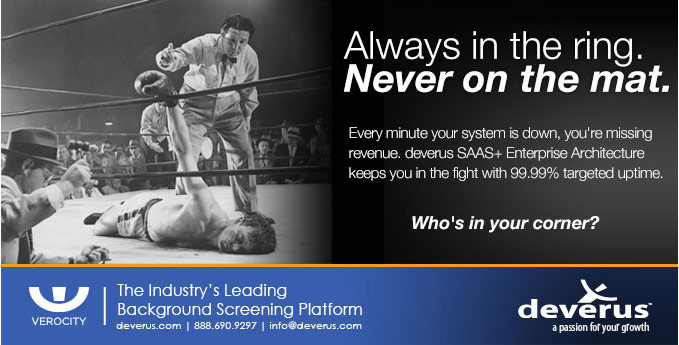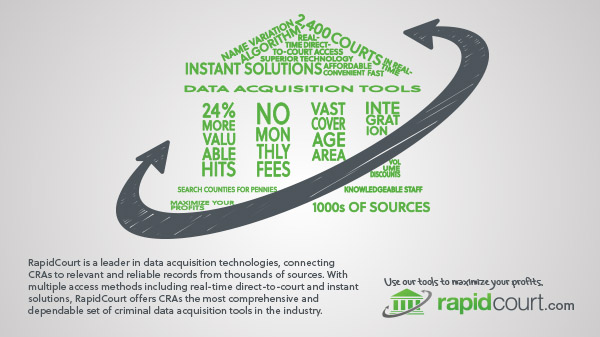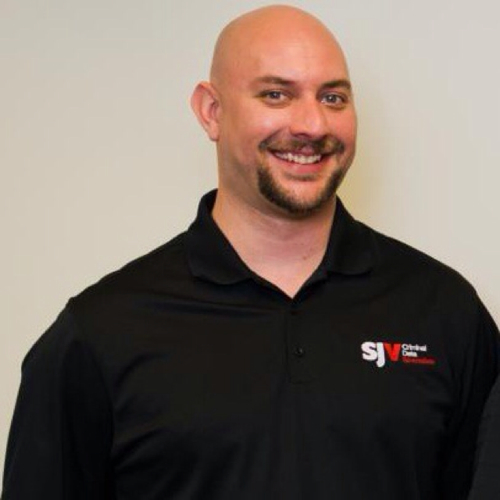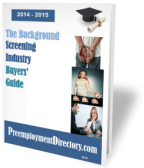| EMPLOYMENT
SCREENING NEWS |
Credit
Checks Pose Hurdle for Job Seekers
Employers
are permitted by law to run credit checks on employees or prospective
employees, and nearly half do, according to a 2012 study by
SHRM. But there are limits to how these checks can be ordered
and used, and the FTC and the EEOC want employers and employees
to be aware of them by jointly issuing two guides explaining
how the Fair Credit Reporting Act and antidiscrimination law
restrict the practice. The guides point out legal safeguards
such as the requirement for written permission from the employee
or applicant before a credit check is run, the employee or applicant's
right to review and resolve any negative finding in the credit
report before the employer acts on that information, and prohibitions
in the law against using credit checks in a discriminatory manner.
According to fair credit attorney Jim Francis, employer compliance
with the law is a problem. Francis says he sees "widespread
violation" of the pre-adverse action notification. "The employer
just moves on to the next candidate. That is not what the law
provides," Francis said. "At a minimum, the law requires five
days to dispute and resolve" the negative information on the
report.
Read more

Running Criminal Background Checks? Be Careful, at Least
in the Big Apple
While criminal
background checks are a common part of the hiring process for
many companies, there has been legal pushback lately with federal
and state authorities both launching cases against employers
they say are using the checks unfairly. The thrust of complaints
by both the U.S. Equal Employment Opportunity Commission and
New York State has been that blanket rejection of all applicants
with a criminal background is not OK - especially if it can
be proven that such a practice has a disproportionate impact
on black or other minority applicants. While the federal EEOC's
complaint against BMW and Dollar General's background check
practices is ongoing, New York authorities have reached an agreement
with a national home goods retailer to end its policy of disqualifying
job seekers who have a felony record. Attorney General Eric
Schneiderman said that Bed Bath & Beyond has promised to
comply with laws prohibiting employers from automatically rejecting
applicants with criminal convictions. As part of a settlement,
the company agreed to pay $125,000. Most of the money will go
to people denied employment and to organizations that help former
offenders find jobs. Schneiderman's office investigated the
company following a complaint from a job fair.
Read more

Protect Our Kids From Predators
One-hundred
thirty. That is the number of teachers across America who have
been arrested for sexual misconduct since Jan. 1. That is more
than one teacher for each day of the year so far.
The stories
are heartbreaking. A 13-year-old girl raped 30 times by her
teacher, young boys lured in by teachers over Facebook or text
messages, a special-needs kindergarten girl forced to go shirtless
in class, and numerous teachers arrested for possessing child
pornography. The list goes on and on. And these are just the
predators who have been caught.
Pat
Toomey and Joe Manchin, U.S. Senators from West Virginia
have introduced the Protecting Students from Sexual and Violent
Predators Act. The bill requires any state education agency
receiving federal funds to perform background checks on all
employees and contractors - new hires and existing employees
- who have access to children. Amazingly, as the Government
Accountability Office recently reported, five states do not
mandate background checks for school employees and 12 states
do not require background checks for contractors who work at
schools. Our bill requires that these checks be repeated regularly,
to prevent anyone from slipping through the cracks.
Read more

Efforts
to Close Loophole that Kept Sex Offender Working at School
Background
checks are supposed to weed out the questionable employees,
and, in most cases, they do.
Still, it doesn't catch crimes committed after they're hired.
This loophole allowed a sex offender to be employed around children.
Seattle Public Schools was shocked to learn a sex offender was
working as a high school janitor. He went undetected for nearly
a decade. It was only found through a state audit.
It's why the Washington State Auditor wants the "rap back" system
in place. Rap back would provide ongoing monitoring for school
employees, foster parents, many licensed health care workers
- and even police. As it stands, periodic checks are mostly
required only on the state level.
Read more

Put 'Trust, But Verify' to Work in Employment Relationships
Employers
should ensure all job applicants are fully (and lawfully) vetted
and job applicants should ensure their resumes are accurate.
Recent events in college basketball underscore the importance
of the "trust, but verify" course.
Steve Masiello
was an assistant coach at the University of Louisville under
head coach and mentor Rick Pitino until he was hired as the
head coach at Manhattan College on April 11, 2011. In just three
seasons, the 36-year-old Masiello established himself as a rising
star in the college coaching ranks. After his team was narrowly
defeated by Pitino's defending national champion Louisville
Cardinals in the first (full) round of the 2014 NCAA college
basketball tournament, Pitino touted his protégé to
be the next head coach for the University of South Florida men's
basketball team. Masiello and USF agreed in principle to a multi-year
contract reportedly worth $5 million. Like so many employment
offers, though, the agreement was contingent on USF's verification
of Masiello's credentials. Now, amid a discrepancy discovered
during a routine background check, not only has USF decided
not to hire Masiello, but it appears his current job may be
in jeopardy.
Read more



Illinois
HB 4778 Threatens Property Managers with Additional Restrictions
Rep. Chris Welch, introduced Illinois House Bill 4778 back in
February of 2014, in an attempt to amend the Landlord and Tenant
Act, which would mean big changes for property managers and
the tenant screening community. If the legislation passes, additional
restrictions will be enforced on property managers throughout
the state. The Chicago land Apartment Association (CAA) is in
strong opposition of the bill, which if passed, would mandate
that landlords could not charge more for an application fee
that exceeds the property manager's actual out-of-pocket costs
to enter into a lease. Nor could property managers who collect
application fees make any misrepresentation to the applicant
about current or future availability of the unit the lessee
is attempting to rent. Additionally, HB 4778 would require the
property manager to disclose in writing, specific grounds that
led to the denial and provide a copy of any information obtained
from a third party that contributed to the decision of denying
the applicant tenancy. Should a property manager violate any
of the provisions introduced in HB 4778, they become liable
to the lessee for the application fee, a civil penalty of up
to $200 and reasonable attorney's fees and costs.
Read more

Landlords:
Always Conduct a Background Check on your Tenants
No landlord would ever want to deal with tenants
who don’t pay their rent. But with the global economic
meltdown, as well as, a general increase in the tendency to
default on rent payment, it has become more important than ever
to make a background check on renters. Based on a recent survey,
the number of extreme cases of rent arrears in 2013 alone reached
over 94,000 which was 5% more compared to the figures in 2012.
Property owners have to be more careful than
ever to ensure that they will not fall prey to potential bad
paying tenants. Owners need to ask all the necessary details
about their potential clients, before they allow them to use
their property. Here are some tips for property owners to ensure
that their client’s background is checked:
Read
more

| Welcome
to the U.S. Legal Challenge Question! |
Sponsored
By:


As the background
screening industry continues to get more competitive the firms
that will ultimately succeed will be those that create competitive
advantage through their people by offering continuous learning
opportunities to heightened their knowledge and capabilities.
We believe that having employees that are very knowledgeable about
the legal landscape of background screening is essential to continued
success.
We are grateful
to Larry D. Henry who began his law career with the Army JAGC
where he tried over 2,000 cases. After the Army he relocated to
Tulsa. In 1981, the founder of DAC Services contacted Mr. Henry's
firm for assistance in creating a background screening company.
Since Mr. Henry's practice was employment law, the firm believed
this fell within his area and as they say: "the rest is history".
His practice has kept him in continual contact with the background
screening industry, and he is a nationally recognized expert in
the area of background screening.
Mr. Henry's
practice is concentrated on employment law and in specific, background
screening of employees. He represents consumer reporting agencies
throughout the United States and two national trade associations.
He is the author of the Criminal Records Manual and the on line
reference site:CRAHelpDesk.com, and he is a frequent presenter
across the country on various topics dealing with background screening.
Please choose
your answer by clicking on it:

| TENANT
SCREENING NEWS - continued |
Background
Check Firm's Slipup Could Cost It
A company
that provides background checks must face claims from a man whom
it allegedly incorrectly described as a sex offender, costing
him work, a federal judge ruled. Harold Charles Meyer claims that
National Tenant Network (NTN) sent an inaccurate consumer report
to Meyer's prospective employer and landlord, Shorewood RV Park,
claiming he had "three criminal sex offense record, which were
listed as 'violent sex offender, fail to register,' 'sexual battery'
and 'aggravated oral sexual battery.'" Both Harold and Phyllis
Meyer, who had applied with him for the assistant resident manager
position, were then denied employment and residence at Shorewood.
The couple contacted the NTN for copies of Harold's file but the
defendant allegedly never responded to their requests. They blamed
the inaccurate sex-offender designation on NTN having mistakenly
relied on the consumer reports of several other individuals with
similar names. One surviving count alleges that NTN improperly
bars those whom it provides with consumer reports, like Shorewood,
from disclosing the contents of those reports to the subjects,
like the Meyers. However, the Meyers failed to allege that "NTN
either knew or should have known that the report it furnished
to Shorewood was for employment purposes," according to the ruling.
Read
more

| BACKGROUND
SCREENING INSIGHTS |
 Banning the
Box: What's the effect on CRAs? Banning the
Box: What's the effect on CRAs?
By Derek Hinton
There is an
increasing trend for cities and states to prohibit this practice,
known in the industry as "Ban the Box." These initiatives typically
remove the question on the job application about an individual's
conviction history and delay the background check inquiry until
later in the hiring process."
Is ban the
box good or bad for CRAs? At first blush, it seems that any screen
that is pushed further to the end of the process, when presumably
there are fewer qualified applicants, would reduce a CRA's business.
On the other hand, I have read an article from the owner of a
CRA that states "The HR guy in me hates this trend [ban
the box] and recognizes that it will waste employers' and applicants'
time and effort. The owner of a background screening company in
me recognizes that this trend means more background checks from
our customers." Whether ban the box increases or decreases a CRA's
business may depend on several varying factors that differ from
employer to employer. A couple of these factors could be the prevalence
of criminal activity in the employer's pool of applicants and,
the nature of the position/hiring standard for which the applicants
are applying. But, if you have any thoughts, or experience in
this area, I would like to hear it.
Read
more



Two
Data Brokers Settle FTC Charges That They Sold Consumer Data Without
Complying With Protections Required Under the FCRA
Two data
brokers have agreed to settle FTC charges that they violated the
FCRA by providing reports about consumers to users such as prospective
employers and landlords without taking reasonable steps to make
sure that they were accurate, or without making sure their users
had a permissible reason to have them. The two companies - Instant
Checkmate, Inc., and InfoTrack Information Services - have agreed
to pay civil penalties and will be prohibited from continuing
their alleged illegal practices. According to the FTC's complaints,
both companies operated as consumer reporting agencies under the
law but failed to abide by the FCRA. The FTC charged, among other
things, that in many instances InfoTrack provided inaccurate information
suggesting that job applicants potentially were registered sex
offenders, possibly causing employers to reject their job application.
According to the complaint against Instant Checkmate, the company
failed to require that users of its reports identify themselves
or certify the purpose for which they were seeking consumers'
information. "Consumers shouldn't have to worry that they'll be
turned down for a job or an apartment because of false information
in a consumer report," said Jessica Rich, Director of the FTC's
Bureau of Consumer Protection.
Read more

Beyond Credit Reporting: The Extension of Potential Class
Action Liability to Employers under the Fair Credit Reporting
Act
The provisions
of FCRA apply to any business entity that seeks to use a "consumer
report" - which broadly includes anything from a credit report
to a criminal or even motor vehicle background check - for any
"employment purposes." The consequences of a FCRA violation can
be substantial; the statute provides for a civil private right
of action and permits recovery of actual damages, statutory damages,
punitive damages, and attorneys' fees and costs. As with many
federal consumer protection statutes, the stakes are even higher
in a putative class action. This risk includes potential class
liability for damages, which could include up to $1,000 in statutory
damages per class member for "willful" violations, in addition
to potential punitive damages. And, unlike other federal consumer
protection statutes, there is no cap on the recovery of statutory
damages in a FCRA class action. Not surprisingly, there has been
an increase in the number of FCRA putative class actions filed
against employers for their purported use of consumer reports.
For these reasons, any business entity that collects background
information for prospective or current employees must be aware
of the requirements of FCRA and should design its employment practices
in compliance with those requirements.
Read more

FCRA Class Action USB Financial Services
This is a
consumer class action based upon Defendant UBS Financial Services,
Inc.'s (UBS) violations of the Fair Credit Reporting Act, 15 U.S.C.
§§ 1681 et seq. (FCRA). UBS systematically violates
at least two sections of the FCRA: section 1681b(b)(2), by procuring
consumer reports about current or prospective employees and deceptively
embedding improper release language, as well as other extraneous
language, in the consumer consent and disclosure document that
UBS requires prospective and current employees to sign prior to
ordering a background check; and, section 1681b(b)(3), by using
employment background checks to make adverse employment decisions
without providing the consumer job applicants who are the subjects
of the background checks a copy of the report used, along with
a summary of his or her rights under the FCRA, and a sufficient
amount of time to contest and/or correct any errors in the reports
before the adverse action is taken. The Plaintiff in this case
seeks relief against the Defendant including: That judgment be
entered against the Defendant for statutory damages in the amount
of not less than $100 and not more than $1,000 per violation per
Class member; That judgment be entered against the Defendant for
punitive damages, etc.
Read more

DID
YOU KNOW?
Nationwide
Litigation Score Card
| Discrimination
& Harassment (total 61 cases January to March 2014)
|
EMPLOYEE
WINS |
Median
Win |
|
Age Discrimination |
38%
|
$117,821 |
|
Disability Discrimination |
63%
|
$112,400 |
|
Race/National Origin Discrimination |
29%
|
$175,000 |
|
Religion Discrimination |
29%
|
$825,000 |
|
Sex Discrimination |
67%
|
$67,900 |
|
Sexual Harassment |
80%
|
$205,000 |
Source: Litigation
ScoreBoard, volume 10, Numbe1, January to March 2014

Public
Record Update
Sponsored by:

Public
Record Update
By Mike Sankey, PRRN
| BRB's
FREE RESOURCE CENTER |
For the MOST
COMPREHENSIVE RESOURCE describing all access methods, restrictions,
fees, and search procedures on over 26,000 government and private
agencies visit the Public Record Research System (PRRS-Web) .
We provide the extensive details and in-depth data you will not
find doing a Google search!
Other items
available at this site that you can download include:
- PRRN Logos
- For Both Web and Print
- Compliant
Form
- Model
Agreement Between a Researcher and a Background Screening Firm
(CRA)
- Researcher
Client Forms
- Public
Record Retrieval Industry Standards Manual
For more
information contact Michael Sankey at mike@brbpublications.com
or visit www.brbpublications.com/updates.aspx
| 2014
PRRN MEMBERSHIP DIRECTORY |

The PRRN
Membership Directory is Your Guide to Finding a Professional
On-Site Researcher Who Can:
- Search
Court Dockets in Person
- View and
Copy Pages From Case Files
- Obtain
Probate Documents
- Obtain
Copies of Liens and Judgments
- Search
Real Estate Records
- Search
All Local Recorded Documents
The Directory
is conveniently organized into two sections. The first allows
you to search for a retriever by state and county, indicating
the types of records these on-site retrievers search. The second
section provides a full profile of each member including contact
information, local retrieval areas, types of records retrieved,
billing terms, turnaround times and additional information.
Public Record Retriever Network (PRRN)
is the organization that has set the industry standards for the
retrieval of public record documents and with a Code of Professional
Conduct.
Please call or email Mike Sankey if you have any questions at
800-929-3811 or mike@brbpublications.com

Joining
Other States and Localities, Indianapolis "Bans the Box" for City
Vendors and Further Restricts Criminal Background Inquiries
Mayor Gregory
A. Ballard recently signed an ordinance that generally prohibits
the Consolidated City of Indianapolis and Marion County (hereinafter,
"City") and its vendors from inquiring into an applicant's criminal
history until after the applicant's first interview. In addition
to "banning the box," the Ordinance further restricts the types
of arrest and conviction records the City or its vendors may ask
about or otherwise consider following the first interview. The
Ordinance joins an ever-growing patchwork of laws that curbs inquiries
into or the use of an applicant and/or employee's criminal history
in employment decisions. Indeed, approximately 10 states and 50
localities have "banned the box" and, although many of these laws
only apply to public employers, several local ordinances cover
government contractors. And, many more jurisdictions have imposed
other limitations on criminal background checks for private and
public employers, as well as for city vendors. When vendors violate
the Ordinance, the City may deny awards of contracts. Vendors
also may incur a fine of no more than $2,500 for a first violation
and $7,500 for a second or subsequent violation. Unless otherwise
exempted, vendors should refrain from asking questions relating
to arrests and/or convictions until after the applicant's first
interview.
Read more

Sixth Circuit Affirms Dismissal of EEOC Credit Check
Case and Rejects "Homemade" Method of Determining Race by "Eye-Balling"
Photos
The Sixth
Circuit affirmed a lower court order granting summary judgment
in favor of Kaplan in a high-profile credit check lawsuit that
the EEOC brought against the education company. The EEOC alleged
that Kaplan's use of credit checks causes it to screen out more
African-American applicants than white applicants, creating a
disparate impact in violation of Title VII of the Civil Rights
Act of 1964. In support of its allegations, the EEOC relied on
statistical data compiled by its expert witness. The expert witness
assembled a team of "race raters" and directed them to review
the photos and classify them by race. Based on the results of
this "race rating," in a sample of 1,090 (out of 4,670 applicants),
the percentage of black applicants who were flagged for review
based upon their credit histories was higher than the percentage
of white applicants who were flagged. The lower district court
excluded the EEOC's expert's testimony as unreliable. The EEOC's
"homemade" methodology for determining race was, "crafted by a
witness with no particular expertise to craft it, administered
by persons with no particular expertise to administer it, tested
by no one, and accepted only by the witness himself."
Read
more



TransUnion Legislative Update
On February 26, the National Technical Information Service
(NTIS) issued a Request for Information (RFI) in order to solicit
public comment regarding access to the Death Master File (DMF).
As required by budget bill passed by Congress, NTIS was required
to establish a certification program by which entities may gain
access to the DMF. The RFI sought input on how companies use the
DMF for legitimate fraud purposes and how companies would provide
assurances the DMF data would be safe against unauthorized access.
On February 27, the CFPB's Consumer Advisory Board conducted a
public hearing on the consumer experience with the credit reporting
system. Stuart Pratt, President & CEO of CDIA, represented
the industry before the CAB. On the same day, CFPB released a
report entitled, "Credit Reporting Complaint Snapshot." The report
found that accuracy issues in credit reporting were the most common
complaints the CFPB received from consumers. In Puerto Rico, HB
1354 passed the House on Feb. 13 and is on its way for consideration
in the Senate. The bill conflicts with existing requirements under
the FCRA, which requires CRAs to include notices of direct furnisher
disputes in each consumer report that contains the disputed information.
Read more

Wisconsin
Adopts Password Protection Law
Wisconsin has become the thirteenth state to enact a law limiting
the circumstances under which employers may request or require
access to the personal internet accounts of applicants and employees.
The 2013 Wisconsin Act 208,which amends the Wisconsin Fair Employment
Act (WFEA) and will be enforced by the Department of Workforce
Development (DWD), prohibits employers from "requesting or requiring"
employees and applicants to provide "access information" for their
"personal Internet account" or "to otherwise grant access to or
allow observation of that account." In addition to prohibiting
these requests for access information and access, the new law,
as a general rule, prohibits employers from discriminating or
retaliating against (e.g., discharging or refusing to hire) an
employee or applicant who exercises their rights under the law.
While the law primarily protects the privacy of employees and
applicants, it also offers employers a limited degree of protection.
Because the meaning and impact of the law's requirements and exceptions
will evolve over time, employers should approach access issues
with care and on a case-by-case basis. Employers should also keep
in mind other risks associated with monitoring the social media
activity of employees and applicants.
Read more

Statewide Ban the Box Reducing Unfair Barriers to Employment
of People With Criminal Records
Nationwide, over 50 cities and counties have now taken
the critical step of removing unfair barriers to employment in
their hiring policies. Widely known as "ban the box," these initiatives
remove the question on the job application about an individual's
conviction history and delay the background check inquiry until
later in the hiring process. Momentum for the policy has grown
exponentially, particularly in recent years. Today there are a
total of ten states representing nearly every region of the country
that have adopted ban-the-box policies-California (2013, 2010),
Colorado (2012), Connecticut (2010), Hawaii (1998), Illinois (2013),
Maryland (2013), Massachusetts (2010), Minnesota (2013, 2009),
New Mexico (2010), and Rhode Island (2013). Hawaii, Massachusetts,
Minnesota, and Rhode Island have banned the box for private employers,
which many advocates embrace as the next step in the evolution
of these policies. Federally, the EEOC has endorsed ban-the-box
as a best practice in its guidance for employment decisions considering
arrests and convictions. In an era of extreme mass incarceration,
ban-the-box campaigns provide a platform to educate the public
about the stigma of a criminal record and the real consequences
to our society of depriving millions of Americans with past convictions
of economic stability.
Read
more

5 Ways to Prevent Negligent Hiring Claims
With the ever-growing driver shortage looming, many
motor carriers are lowering their hiring standards to fill their
empty trucks. No company wants to turn down a job because they
don't have drivers to service the account. But while companies
to some extent are at the mercy of supply and demand, carriers
have to keep the potential for negligent hiring lawsuits top of
mind. Negligent hiring is based on the principle that companies
have a responsibility to protect their clients and the public
from injury at the hands of their employees. Companies can be
held liable for property damages, deaths and physical injuries,
and other errors caused by their employees within the scope of
their employment. If you don't establish driver hiring standards,
you will have a hard time defending your recruiting processes
in court if they were ever challenged in a negligent hiring suit.
Negligence can be alleged in all aspects of managing your employees:
in hiring, retention, and when changing job responsibilities.
It is important that you: Do your homework before hiring drivers;
Put driver hiring policies in writing; Train drivers for success;
Keep your ear to the ground; and Re-evaluate if you change the
job duties.
Read more

Fingerprints
and Photos Could be Part of Background Check Record
Many jobs
require background checks on applicants, including for those who
would have direct contact with vulnerable adults. However, as
more data on the individual is required and as technology advances,
state agency policies regarding secure storage and data destruction
need revision.
Rep. Tina Liebling (DFL-Rochester, pictured) sponsors HF2467 that would
allow the Department of Human Services to fully automate and expand
the electronic background study system, and collect fingerprints
as a requirement to fill certain jobs where a person would have
direct contact with a vulnerable adult. It would also provide
for the length of time the information would be retained and a
procedure for the subject of the background check to access it.
After hearing
the bill on Tuesday, the House Civil Law Committee moved it to
the House Judiciary Finance and Policy Committee.
Read more

No
Need For Businesses To Fear 'Ban The Box' Measure, Employment
Attorney Says
Louisville
has joined the ranks of cities to enact an ordinance prohibiting
employers from asking job applicants about their criminal backgrounds.
The bill applies only to the city and its private vendors.
According
to Tom
Birchfield, a managing partner at Louisville-based Fisher
and Phillips LLP law firm said, "I don't think it is that big
of a deal because it says you can't have a box on the application."
Ban the Box supporters say the measure simply prevents businesses
from summarily dismissing job applicants who admit they've been
convicted of a crime. In most cases the city or its vendors now
can't ask about conviction history until after they have determined
that applicants otherwise are qualified for positions.
Read more

Rhode
Island Bill Expands Background Checks for Third-party School Employees
Scott Sanford worked closely enough with East Greenwich schoolchildren
to give them treats on the school bus. But the friendly bus monitor
was not a "school employee." This meant he was not legally required
to pass a national criminal background check before he started
working with East Greenwich schoolchildren, including the son
of a state lawmaker. Sanford's employment with a third-party contractor
drew attention in November when the 35-year-old town resident
was arrested by state police on child pornography charges. The
father of the 11-year-old boy who rode on the bus with Sanford,
testified before state lawmakers in a bid to expand the state
law on criminal background checks. "What this bill does is it
simply tightens up the existing law that we have," Rep. Antonio
Giarrusso, R-East Greenwich, told the House Committee on Health
Education and Welfare. The bill adds employees of third-party
vendors and contract employees who work at schools to the list
of individuals who must pass a national criminal background check
under state law, said Special Assistant Attorney General Joee
M. Lindbeck. That new language and other changes would give greater
protection to children, Lindbeck said.
Read more

State Bill Would Regulate Health Care Navigators
Arizona has joined several other states considering measures that
would require extra licensing and background checks for health
exchange navigators who help people buy coverage. The state House
approved a bill that would require navigators to get a license
through the state Department of Insurance and to pass a criminal
background check. Proponents say the requirements protect consumers
who share private information such as Social Security numbers
from identity theft. But Democrats say the bill is an attempt
to slow down enrollment and that it's unnecessary because navigators
already have contracts with the federal government. "What we're
doing here is we're just handling the background checks and licensing
to make sure we're protecting our consumers," Arizona Rep. Paul
Boyer, R-Phoenix, said. Debbie McCune Davis, D-Phoenix, said Arizona
gave up its right to license navigators when it failed to adopt
its own state insurance exchange program. She said the Centers
for Medicare & Medicaid Services has already established guidelines
that regulate navigators, and that a judge struck down a similar
law in Missouri. The Arizona bill would not impose a fee or extra
training but it would bar anyone convicted of a misdemeanor involving
fraud or dishonesty from becoming a navigator.
Read more

Nebraska
Joins Growing Number of States to Pass "Ban the Box"
Nebraska
recently became the 11th state to pass "Ban the Box,"
a law that removes questions about criminal records on state job
applications. Enacted on April 17th, the law requires
that questions regarding criminal records be postponed until after
an applicant's qualifications are first screened. The purpose
of this measure is to give individuals with criminal records a
fair chance in the job application process.
Read more

New Georgia Law Limits Employer Liability for Hiring
Workers with Criminal Background
A new law
in Georgia protects employers from negligent hiring and retention
claims by creating a presumption of "due care" for hiring and
employing individuals with criminal backgrounds who have received
a "Program and Treatment Completion Certificate" from the Department
of Corrections or a grant of pardon from the State Board of Pardons
and Parole. Governor Nathan Deal signed Senate
Bill 365 on April 13, 2014. The law is due to take effect
on July 1, 2014; however, no timeline has been released for the
Department of Corrections to implement the new certificate program.
An employer's
presumption of "due care" may be rebutted by evidence demonstrating
the employer knew or should have known relevant information that
extended beyond the scope of the certificate or pardon. Because
of this exception, employers should continue to assess applicants
carefully.
Read
more

Oklahoma Law Requiring Fingerprint-Based Background Checks
for Nursing Home Employees in Effect
Elderly persons
are among the most vulnerable citizens and often face abuse and
neglect while living in a nursing home. The Centers for Disease
Control estimates that approximately 22 percent of nursing home
residents are subjected to abuse and 21 percent are neglected.
But The Oklahoma Long Term Care Security Act, which took effect
at the beginning of March, aims to protect the elderly from facing
harm at the hands of the caregiver. Under state and federal regulations,
nursing homes are required to conduct background checks on the
staff members they hire. The purpose is to weed out any staff
members who have abused or financially exploited a patient in
the past. But these background checks are often not comprehensive
enough to determine if a potential new employee has a propensity
towards abuse or violence.
The new law
requires that nursing homes in Oklahoma to conduct finger-print
based background checks before they hire a new employee that will
have direct contact
with a resident or patient. This applies to all institutions that
provide healthcare, according to KOCO-TV.
Read more

Nevada's
Medical Marijuana Law Takes Effect April 1, 2014
Nevada's
medical marijuana law, Nevada SB 374, explicitly states that it
does not "require any employer to allow the medical use of marijuana
in the workplace." However, the law further states that it does
not "require an employer to modify the job or working conditions
of a person who engages in the medical use of marijuana that are
based upon the reasonable business purposes of the employer but
the employer must attempt to make reasonable accommodations for
the medical needs of an employee who engages in the medical use
of marijuana if the employee holds a valid registry identification
card, provided that such reasonable accommodation would not: (a)
Pose a threat of harm or danger to persons or property or impose
an undue hardship on the employer; or (b) Prohibit the employee
from fulfilling any and all of his or her job responsibilities."
There have been a handful of legal challenges to medical marijuana
laws in other states and thus far, the outcomes have been favorable
for employers. Employers should be cognizant of the laws in the
states in which they operate before deciding on a course of action
with respect to medical marijuana users.
Read more

'Ready
to Work' Bill Introduced
Congressman
Kevin Brady (R-TX), a senior member of the House Ways and Means
Committee, today introduced the Ready to Work Act, a
two-page bill designed to force the Department of Labor to carry
out a key provision of the Middle Class Tax Relief and Job
Creation Act. Signed over two years ago by President Obama,
this law allows states to drug test unemployment insurance recipients
seeking jobs that regularly require drug testing.
"In order
to be job ready for industries where drug testing is the norm,
potential employees need to be able to pass a drug test," noted
Brady. "Unemployment insurance is for those who are actively looking
for work and are job ready. If a potential employee cannot pass
a drug test, they are not job ready."
Read more

US Supreme Court Rejects Florida Drug Testing Appeal
The decision
by the nation's highest court means that the ruling by the 11th
US Circuit Court of Appeals finding the plan unconstitutional
stands.
The governor
had issued an executive order in March 2011 directing all state
agencies to drug test new hires and randomly test current employees.
But that order was challenged by the American Federation of State,
County, and Municipal Employees Council 79, representing state
workers.
The union
argued that random drug testing was a violation of the Fourth
Amendment's proscription against unreasonable searches and seizures.
In its decision, the 11th Circuit generally agreed with the union,
finding the suspicionless drug tests unconstitutional, but also
ordered the state and the union to determine which state employees
could be subjected to such testing.
Read more

 CoreLogic Expands
Tenant Screening Services CoreLogic Expands
Tenant Screening Services
CoreLogic,
a global property information, analytics and data-enabled services
provider, today announced the expansion of its tenant screening services
to deliver enhanced data for rental applicant screenings
for single-family rentals and the "small-landlord" market. The
expansion of services, offered through myrental.com, leverages
the vast CoreLogic public record and proprietary databases to
provide unique applicant data for landlords to assess applicant
risk and identify those renters who are most likely to fulfill
their lease obligations.
Read more

Infomart
Named Current CEO Charles Esposito As Its New Chairman.
On April 1, 2014, InfoMart, a national background check company,
has named current CEO Charles Esposito as its new chairman. "Chip
is an extraordinary leader at InfoMart and a preeminent expert
in the security industry. As InfoMart celebrates its 25th anniversary,
we are fortunate to have him continue his legacy of excellence,"
said Tammy Cohen, founder and president of InfoMart.
Esposito has more than 30 years' experience in the security industry,
and an extensive background in sales, marketing, management, strategic
alliances and acquisitions. During his 20-year tenure at ADT,
Esposito was responsible for business development and management
of several national accounts.
At InfoMart, Esposito has served as general manager, chief operating
officer, and was most recently seated as CEO. In his role as CEO,
he utilized his extensive industry knowledge and sales expertise
to help InfoMart further position itself as a leader in the background
screening industry. He is responsible for bringing several national
accounts to InfoMart, developing strategic alliances, as well
as nurturing relationships with key clients.
For more information please visit www.infomart-usa.com


RISQ Group Announces the Launch Of RISQ
China
SYDNEY
- RISQ Group, the leading Asia focused pre employment
screening company, has expanded by establishing a new sales and
operations center in Beijing, China. Ficoal Dong, a pioneer of
the pre employment screening market in China, has been appointed
as Managing Director of RISQ China.
"Ficoal's
knowledge and understanding of the local and international employment
screening markets makes him uniquely qualified for this opportunity,"
explained Nick Roberts, CEO of the RISQ Group.
According
to Mr Roberts, the establishment of RISQ China is the latest step
in RISQ Group's strategy of cementing its position as the experts
in delivering robust, risk-based screening programs to clients
in Asia and around the globe. This strategy has seen the company
develop the most extensive network of in-house operations centers
in Asia and allows it to continue to build on its position as
the premium provider in the market. This is thanks to its unique
operating model, which delivers superior client and candidate
experience with faster turnaround and higher verified rates.
"The market
for pre employment screening services in China is growing and
offers significant opportunity. We look forward to bringing the
RISQ Group expertise to the broader market of companies who require
these services," said Ficoal Dong, Managing Director of RISQ China.
For more
information visit www.risqgroup.com

 Pre-Employment
Screening Program Debuts Full Redesign Pre-Employment
Screening Program Debuts Full Redesign
The NIC Technologies
team, in partnership with the Federal Motor Carrier Safety Administration
(FMCSA) released an enhanced version of the Pre-Employment
Screening Program (PSP), available at www.psp.fmcsa.dot.gov.
The site offers the same features and functionalities that users
have come to expect, all with an exciting refreshed user interface
based on the FMCSA's new web standards. The PSP relaunch also
features responsive design, meaning the site is optimized for
a user-friendly display from any desktop or mobile device.
"FMCSA has
worked hard on the relaunch of their agency site, and we are pleased
to follow their lead with PSP," said Elizabeth Pemmerl, NIC Technologies'
General Manager. "Site visitors can enjoy a consistent experience
on the FMCSA and PSP sites, as well as access PSP quickly and
securely from their preferred device."
NIC and FMCSA
have partnered since 2010 to deliver the Pre-Employment Screening
Program via a no-cost contract. NIC provides all development,
hosting and maintenance of the PSP service - as well as customer
service, education and outreach - at no cost to the agency; the
system is supported through the user fees paid by carriers and
drivers requesting PSP records.
For more
information visit http://www.egov.com/

Help
Wanted Signs Are Popping Up in U.S. Cities
To hire 10
to 15 project coordinators this year, Texas builder Sabre Commercial
has boosted pay 10 percent and added a 401(k) retirement plan.
"It is an employee's market," says John Cyrier, co-founder and
president of the 48-employee Austin-based company. "We are definitely
seeing a labor shortage in Austin and central Texas. I see it
only getting worse."
Companies
in cities across the U.S. are struggling to fill positions, with
jobless rates in some metropolitan areas below the 5.2 percent
to 5.6 percent level the Federal Reserve regards as full employment
nationally. Competition for workers is prompting businesses to
raise wages, increase hours for current employees, add benefits,
and recruit from other regions.
Four years
ago, during the worst of the labor market slump, only two cities-Iowa
City, Iowa, and Lincoln, Neb.-had jobless rates below 5 percent.
"That says the economy is getting better in a lot of places,"
says David Wiczer, labor market economist at the Federal Reserve
Bank of St. Louis. Although national unemployment is a closely
watched indicator, "it is difficult to average things. This does
have implications for wage pressure at the local level."
Read more

| EVERIFY
& IMMIGRATION ISSUES |
Georgia
Construction Company Hit with $228,000 I-9 Penalty
The Department
of Justice, Office of the Chief Administrative Hearing Officer
(OCAHO) has assessed an I-9 related penalty of over $228,000 to
M&D Masonry, a Georgia construction contractor, based on an
audit conducted in May 2010. While the fine is one of the higher
amounts we've seen from OCAHO during the past few years, it actually
represents a considerable improvement over the assessment by ICE
of over $332,000. Based upon an 84% error rate on the I-9 forms,
ICE assessed a baseline penalty of $935 for each violation. It
enhanced the penalty by 5% each for seriousness of the violations
and large size of the company but mitigated by 5% for good faith.
One defense used by M&D was that ICE failed to fully identify
52 employees in Count II, some of which were only identified by
three capital letters. Interestingly, OCAHO found ICE was "unduly
generous" in treating good faith as a mitigating circumstance.
OCAHO concluded "the principle of proportionality" should apply
and lowered the penalties to $650 each for Count I violations
and $750 each for Count II violations - failure to prepare I-9
forms. Overall, M&D was assessed $228,300 in penalties.
Read more

Homeland Security Targets Employers' Immigration Compliance
Investigations
and audits of Form I-9 documents by ICE agents are on the rise,
and the Obama administration is promising to keep the heat on
employers in the coming year. A report by the Inspector General
of the Department of Homeland Security issued in February found
that ICE had fined employers from across the country a total of
$31.2 million for Form I-9 violations between 2009 and 2012. Those
fines were the result of audits conducted at 9,140 employers.
But the fines tell only part of the story: ICE has also criminally
charged employers for violations. There was some good news in
the Inspector General's report. It found that ICE's negotiation
of fines with employers led, in some cases, to substantial reductions
in the fine amount. Overall, negotiations and settlements with
employers reduced initial Notices of Intent to Fine from $52.7
million to $31.2 million in final orders, an average reduction
of 40%. Employers can prepare for a potential ICE audit by conducting
a thorough self-audit of their existing Forms I-9, their current
processes and their past practices. Employers can use this self-audit
to develop new policies and training exercises to standardize
the company's I-9 practices.
Read more

STOP
STRUGGLING WITH WRITING AND PUBLISHING YOUR NEWSLETTER: |

We can help
you have a high quality e-newsletter to help nurture your relationship
with your clients and attract new clients. Our customized newsletter
service will take over your newsletter task or create a new one
for you. We can manage the creation of your newsletter for you.
We are constantly
researching information to use for The Background Buzz and
you can put our research to use for you. Using the information
rich content from The Background Buzz (minus the ads
and competitors information) we will create a custom newsletter
for you.
Use your staff’s
time to do more valuable work and save all the hassle of researching
or writing articles, formatting and managing all the other ezine
tasks with our customized ezine process.
Contact Barry
Nixon at 949-770-5264 or at wbnixon@aol.com
for more information.

 Kevin Coy is a Partner in the Washington DC office of Arnall
Golden Gregory LLP. Kevin
Kevin Coy is a Partner in the Washington DC office of Arnall
Golden Gregory LLP. Kevin
advises background screening companies and other clients on a
wide range of privacy and consumer regulatory issues, including
Fair Credit Reporting Act, Gramm Leach Bliley Act,
Drivers' Privacy Protection Act, and Dodd Frank Act compliance
issues, as well as data breach matters. Kevin also represents
clients with matters before the Federal Trade Commission, the
Consumer Financial Protection Bureau, and other consumer protection
agencies.
Kevin can
be contacted at Kevin.Coy@agg.com
or 202-677-4034.
THE
WASHINGTON REPORT - APRIL 2014
At
the FTC
It has been
a busy month for the Federal Trade Commission (FTC).
On April
9th, FTC announced another pair of Fair Credit Reporting
Act (FCRA) settlements with two screening companies, Instant Checkmate
and InfoTrack, which allegedly provided reports for employment
and tenant screening purposes without complying with FCRA requirements.
The court
orders settling the cases imposed a fine of $525,000 against Instant
Checkmate and $1 million against InfoTrack and its owner (with
all but $60,000 being suspended based on an inability to pay).
While The
Washington Report does not usually focus on court decisions,
we must also note that on April 7, the FTC scored an initial win
in its data security litigation against Wyndham hotels. The court
rejected Wyndham's arguments that the FTC lacked authority under
Section 5 of the FTC Act to bring the suit.
Read
the full report


One
Site! Many Suppliers! |
2013-2014
SUPPLIERS TO THE BACKGROUND SCREENING
INDUSTRY BUYERS GUIDE NOW AVAILABLE!
Looking for the Top Suppliers in the Industry? Need to find a
new Supplier?
Visit our VENDOR SHOWCASE
which features suppliers to the Background Screening Industry.

Click
here or on image to get a copy


Grab a latte,
pull up a chair and join us for a great interview with Nathaniel
T. Borsh
Senior Account Executive, SJV & Associates, LLC.
 Prior to coming into the background screening industry Nate was
an Insurance Claim Representative for a global insurance firm.
Let's just say, you were in good hands if you talk to him. Nate
noted that this was challenging work dealing with catastrophes
all the time. Unfortunately, whenever he spoke to a client, it
was about the worst day of their life. They had just had an accident,
a fire, a theft. He reflected with a sigh, that he burned out
pretty quickly.
Prior to coming into the background screening industry Nate was
an Insurance Claim Representative for a global insurance firm.
Let's just say, you were in good hands if you talk to him. Nate
noted that this was challenging work dealing with catastrophes
all the time. Unfortunately, whenever he spoke to a client, it
was about the worst day of their life. They had just had an accident,
a fire, a theft. He reflected with a sigh, that he burned out
pretty quickly.
With this experience and his desire to advance
his career he pursued an opportunity available in the background
screening industry that would utilize his substantial experience
in client facing roles.
When asked about one thing he particularly likes
about the background industry he paused, smiled and said "Just
one thing? That's tough." He then added, "I believe that I have
truly come to appreciate what a pivotal role our industry plays
in the economy overall. Through our efforts to help guide legislation
on the federal and state level to the bare-bones fact that employers
look to us for expertise and direction in recruiting, screening,
hiring, and maintaining their workforces; the background screening
industry is the backbone of safety, compliance, and fair employment
practices. That is really something that I am proud to be a part
of at this time."
Turning the discussion to SJV & Associates,
Nate shared that "their mission is to be the premier global Research
Provider to the Pre-Employment and Tenant Screening industries.
By combining innovative technology with human expertise, we aim
to deliver timely, high-quality, and complete background screening
solutions, helping our clients make the best hiring decisions
and tenant placements possible with the goal of ensuring a safer
home and work environment."
Nate added as a part of SJV commitment to stay
on the cutting edge to expand their position as a single source
solution provider he is very happy to announce that coming in
May of 2014, SJV & Associates will launch a new 'MedEx' product.
This product line will focus primarily on the needs of Healthcare
Vertical compliance needs and will provide OIG, SAM.Gov, State
Board Actions reports to assist in maintaining conformity with
the requirements of the Affordable Care Act.
In response to my probing to see if there were
any additional information he wanted to share about the company
he said, "there is a lot more." He noted that SJV & Associates
is one of the longest tenured providers in the industry. He said
some people may think that we are still just a regional provider
of criminal records in Georgia, however, while this is a great
part of our business, it is only a fraction of what we do. Nate
beamed as he shared that SJV's Global Reach provides county, state,
civil, and federal level services nationwide as well as in 185+
nations around the world. He added that they offer a suite of
education and verifications services on the international side
of the business. In addition, he note that their Web-Extraction
Automation is second-to-none and that they have more than 5 years
of experience in the industry compared to some of the newer, off
the shelf solutions that are available.
Smiling, as if to say, want some more, Nate extended
the following offer to our readers: If you have not had a chance
to meet us at one of the NAPBS conferences shows, SJV is just
a great group of people who take our business very seriously;
but enjoy sharing in an enjoyable and customer-centric work environment
where our clients are King! Be sure to visit with us at the next
show.
Moving to my favorite question about the future, Nate pondered
and then said: "I believe that we will see more and more digitalization
of information. It has taken nearly 30 years with electronic filing
systems to get us to the point we are currently. Another 10 years
will see some great progress, but information is still going to
require a human element to find, investigate, and disseminate
to be in compliance with our federal and state laws. I firmly
believe that fingerprinting and even retinal scanning are going
to become more and more common place as gateways to storing, filing,
and retrieving information. He chuckled and said, "Hey, I can't
even open my iPhone now without a fingerprint scan. Technology
will dictate the movement of our business in the next decade."
As I moved to close the interview Nate shared
that he had just finished reading, "The Improbability Principal:
Why Coincidences, Miracles, and Rare Events Happen Every Day."
He shared that the person he would really like
to meet was Ralph Waldo Emerson. He believes that his endeavors
to explore and define the inherent goodness within the human experience
would be enlightening.
And, finally, his favorite quote is ""Sometimes
you have to run before you can walk." -Tony Stark a.k.a. Ironman.(Now
we know what kind of movies he likes too)
Thanks Nate for a very informative interview.
To contact Nate you can email him at nathaniel@sjvassoc.com
or call him at (800) 203-0582 ext 293.

Brazil
to Drop Local Data Storage Rule in Internet Bill
Brazil will
drop a controversial provision that would have forced global Internet
companies to store data on Brazilian users inside the country
to shield them from U.S. spying. The rule was added last year
to proposed Internet governance legislation after revelations
that the U.S. National Security Agency had spied on the digital
communications of Brazilians, including those of their President
Dilma Rousseff and the country's biggest company Petroleo Brasileiro
SA. Instead, the legislation will say that companies such as Google
Inc and Facebook Inc are subject to Brazilian laws in cases involving
information on Brazilians even if the data is stored abroad, said
congressional relations minister Ideli Salvatti. She said the
bill, which is opposed by Rousseff allies in the lower chamber
of Congress, has enough support to be put to the vote. Salvatti
said the government will not negotiate a key provision in the
bill on net neutrality, which has faced strong opposition from
telecom companies in Brazil because it would bar them from introducing
differential pricing according to Internet usage and speeds. The
legislation dubbed Brazil's "Internet Constitution" protects freedom
of expression, safeguards privacy and sets limits to the gathering
and use of metadata on Internet users.
Read more
Random Alcohol & Drug Testing Struck Down, Again
An Alberta Board of Arbitration has concluded that an employer's
random alcohol and drug testing policy does not stand up to the
legal test set by the Supreme Court of Canada in last year's Irving
decision. This is a significant early use of the Irving decision
and provides insight into the problems an employer must face -
and prove - before justifying random testing. In 2012, the Union
filed a grievance objecting to Suncor's proposed random alcohol
and drug testing policy on the basis that it is "unjustifiable,
unreasonable, and violates employees' privacy rights, human dignity,
and human rights." The arbitration board considered the decision
in Communications, Energy and Paperworkers Union, Local 30 v.
Irving Pulp and Paper, relating to random testing which held that
there must be "evidence of a problem with alcohol and drugs" in
the workplace in order for random testing to be warranted. This
is the first arbitral decision in Alberta to consider Irving.
It demonstrates that employers must offer powerful and compelling
evidence of a problem with alcohol and drugs at the particular
worksite in order to meet the burden of proof placed upon them
and successfully implement random testing in the workplace.
Read
more

New Fingerprint Technology Being Purchased
The Chatham-Kent Police Service is going high-tech when it comes
to fingerprint records. As with most things in policing, keeping
up with technology is not an option, it's mandated. July
1 is the target date for police agencies to submit fingerprint
forms electronically and as of July 1, 2015, the RCMP will be
requiring all police services to submit electronic fingerprints
for civil matters, including applications for police clearance
checks. The police service board has approved purchasing two Livescan
Cabinet systems for $85,993 and a Livescan Applicant Processing
system for $11,413 to meet this requirement. However, the cost
has not caught the police service by surprise and won't be impacting
the current budget. According to the report to the board, one
workstation will be housed at Chatham-Kent Police headquarters
to take fingerprints for criminal matters that will be submitted
electronically to the National Criminal Records database. Another
workstation will be located in the DNA room at the Chatham-Kent
Courthouse to be used by court services staff. Having a Livescan
workstation at the courthouse will avoid having to transport accused
persons back to police headquarters if it is deemed fingerprinting
needs to take place if additional charges are laid.
Read more
ECJ
Declares Data Retention Directive Invalid
The European Court of Justice (ECJ) has declared the Data Retention
Directive invalid. The Court's decision was grounded on its conclusion
that, by requiring the retention of the data falling within the
scope of the Directive, and by allowing the competent national
authorities to access those data, the Directive interferes in
a particularly serious manner with the fundamental rights to respect
for private life and to the protection of personal data. The judgment
was rendered in response to questions posed to the ECJ by the
national courts of two EU Member States. The Irish High Court
posed questions regarding the legality of national legislative
and administrative measures concerning the retention of data relating
to electronic communications. The Austrian Constitutional Court
posed questions arising from an action by 11,130 individuals in
Austria questioning the compatibility with the Federal Constitutional
Law of the Austrian provisions transposing the Data Retention
Directive into Austrian national law. The ECJ's decision will
trigger a rethink of both EU and EU Member States' laws on government
surveillance.
Read more
Common Lies Found in CVs in Mexico
By David
Robillard
Fudging the
truth on a CV is done by job applicants around the world. According
to CareerBuilder.com 38% of CVs in the US contain lies, call them
errors, mistakes, or exaggerations.
An analyis,
by MultiLatin, of candidate-supplied data in Mexico during the
twelve months of 2013, revealed that twenty seven percent (27%)
had lied about their academic and professional histories while
six percent had criminal records or were defendants in criminal
litigation which they conveniently didn't bother to mention. A
noteworthy example involved a case where the concept of a sabbatical
was taken to new height. A job applicant disguised an obvious
gap in time between jobs by described a professional sabbatical
they took although a criminal litigation search revealed the applicant
actually spent the time in a state prison for drug related charges.
Read
more
Whitewash on the Blacklist
The new regulations to the National Credit Act will keep companies
in the dark about certain information pertaining to employee applicants
and potential vendors. This is according to Jenny Reid, CEO of
iFacts, a company that takes care of corporate security and seeks
to remove people risk in business through pre-employment screening,
background checks, and individual risk assessments. In late February,
Dr Rob Davies, Minister of Trade and Industry, gave notice of
new regulations to the National Credit Act, 2005. The change came
into effect 1 April 2014 and the Department of Trade and Industry
(DTI) has given Credit Bureaus in South Africa approximately two
months to remove adverse consumer credit information from, and
information relating to paid-up judgments. In other words, 6.5
million status updates relating to 4.2 million credit profiles
will soon be deleted. "As it allows for the once-off removal of
negative credit information, plus the continuous removal of paid-up
judgment, it means that there will be no track record of bad payment,
no spoor to follow to identify a trend of reckless or unscrupulous
credit behaviour," said Reid. "In effect, it will increase security
risks around new people coming into a company."
Read
more
Only 8% of Generation X Ever Have the Education
on Their CV's Checked Out
Qualifications
are less likely to be checked the further away from graduation
day a candidate gets, but the Higher Education Degree Datacheck
(HEDD) warns of temptation to embellish on CVs due to pressure
from the new '2.1' wave of graduates. Of the 20,288 enquiries
received since HEDD - the government-backed degree verification
service - 76% have been to check qualifications of those who graduated
after 2000 and almost half are to verify graduates who left university
within the last four years. Just 16% of enquiries were to undertake
checks on those who graduated in the 1990s, and the number was
halved (8%) for those leaving university before the '90s. Eight
per cent of HEDD enquiries have been classified as 'unverified'.
While reasons for this include incomplete or incorrect information
supplied by candidates, such as married names instead of maiden
names, there is also evidence of subject changes, grade inflation,
fake certificates and bogus institutions. "Graduates who are further
on in their career have more opportunity to blatantly lie, exaggerate
or bend the truth a little more than their more recent counterparts
simply because they are not being checked out," said Jayne Rowley
leader of the HEDD initiative at Graduate Prospects.
Read more

Fake Job Applications Most Common Entry Point for Fraudsters,
Says CIFAS
Organisations
are most vulnerable to employee fraudsters at the recruitment
stage, according to a report from the UK's Fraud Prevention Service,
CIFAS. It said that deceitful attempts to gain access to sensitive
data via the recruitment process accounted for more than 50% of
all subsequent internal fraud cases in 2013. Overall employee
fraud rose by 18% in 2013 compared to 2012, but this is the first
time since the founding of the Internal Fraud Database in 2006
that dishonest attempts to gain employment accounted for the majority
of insider fraud cases. Figures show that the most common reason
for application fraud (40%) was because potential employees had
concealed unspent criminal convictions. The number of fake job
applications that are discovered at the hiring stage had increased
by 70% increase in 2013. Despite this, Mike Emmott, CIPD employment
relations adviser, said it was even more important for employers
to invest in comprehensive pre-employment checks now that competition
for jobs had increased. However, the report noted that it isn't
always possible to detect a potential fraudster at the recruitment
stage, because the average length of service an individual spent
with a company before committing fraud was six and a half years.
Read more

Higher Penalties for Employing Migrant Workers Illegally
Professional
HR managers are unlikely to make an adverse assumption about a
job candidate's immigration status on the basis of a name, accent
or appearance. By the same token, these employers will know how
to stay compliant with both immigration and discrimination law,
and are not likely to be affected by the doubling of the maximum
civil penalty for employing a worker illegally (the penalty rises
from £10,000 to £20,000 on 1 May 2014). However, organisations
may derive some benefit from a revised version of the statutory
code of practice for employers on 'Avoiding unlawful discrimination
while preventing illegal working', which has been released in
draft form to coincide with the increased penalties. There is
little new in the code but its central point is a solid one. It
advises employers not to make assumptions about immigration status
and to ask all job candidates to prove their right to work in
the UK by producing specified documents before starting work.
It also says that job applicants can be asked to provide documents
at any stage before they start work.
Read more

|
ADVERTISERS IN THIS EDITION |


|  |
|
|
| |
|
Background
Screening Jobs |
|
Visit
the Job Board for the Employment and Tenant Screening Industry.
Here you will find resumes of people with industry experience
and employers seeking applicants with experience in Employment
and Tenant Screening and related businesses.
www.backgroundscreeningjobs.com


|
UPCOMING CONFERENCES, COURSES & EVENTS |
Feature
Education:
 |
FCRA
Basic Certification Webinar Series Update
The
FCRA Basic Certification program series is now available
for purchase.
For
more information |
2014 Events ( Click
Here to View full list of Events ) - Updated
Monthly
SHRM
State Conferences, visit
http://www.shrm.org/Conferences/StateAffilliateConferences/Pages/default.aspx
Drug
and Alcohol Testing Industry Association (DATIA), 2013 Training
Course Schedule, visit
http://datia.org
SAPAA
Training Institute Learning Events, http://www.sapaa.com/
CUPA-HR
Conferences: http://www.cupahr.org/
World
Federation of People Management Associations, Events,
http://www.wfpma.com/events/by-region#quicktabs-tab-view__events__page_3-4
|
 Kwe
kwe,(pronounced "gway gway"!
Kwe
kwe,(pronounced "gway gway"!  20,000 HR Managers are waiting to find out about your company!
20,000 HR Managers are waiting to find out about your company!





 Banning the
Box: What's the effect on CRAs?
Banning the
Box: What's the effect on CRAs? 



 CoreLogic Expands
Tenant Screening Services
CoreLogic Expands
Tenant Screening Services 
 Pre-Employment
Screening Program Debuts Full Redesign
Pre-Employment
Screening Program Debuts Full Redesign 
 Kevin Coy is a Partner in the Washington DC office of Arnall
Golden Gregory LLP. Kevin
Kevin Coy is a Partner in the Washington DC office of Arnall
Golden Gregory LLP. Kevin 

 Prior to coming into the background screening industry Nate was
an Insurance Claim Representative for a global insurance firm.
Let's just say, you were in good hands if you talk to him. Nate
noted that this was challenging work dealing with catastrophes
all the time. Unfortunately, whenever he spoke to a client, it
was about the worst day of their life. They had just had an accident,
a fire, a theft. He reflected with a sigh, that he burned out
pretty quickly.
Prior to coming into the background screening industry Nate was
an Insurance Claim Representative for a global insurance firm.
Let's just say, you were in good hands if you talk to him. Nate
noted that this was challenging work dealing with catastrophes
all the time. Unfortunately, whenever he spoke to a client, it
was about the worst day of their life. They had just had an accident,
a fire, a theft. He reflected with a sigh, that he burned out
pretty quickly. 


